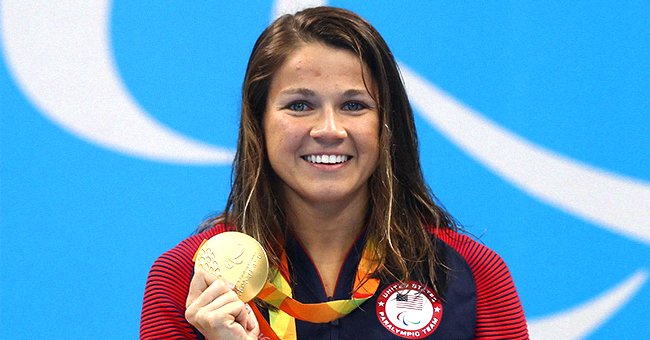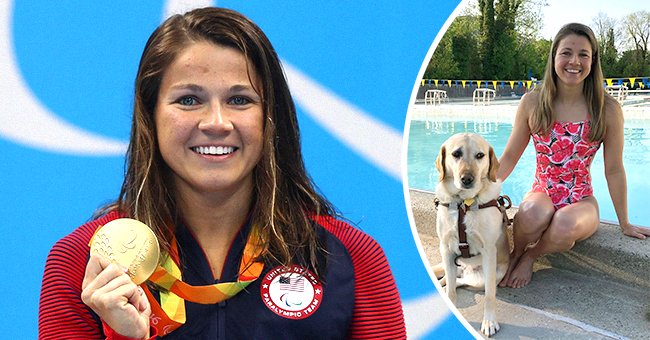
'Deaf-Blind' Swimmer Denied Personal Care Assistant at Paralympic Games Refuses to Participate
Three-time gold medalist Becca Meyers recently had to make the very tough decision of dropping out of the Tokyo Paralympics after being denied a personal care assistant.
The blind-deaf athlete recently took to her official Instagram account to share the "gut-wrenching" story with all of her fans and to explain the details behind her decision.
According to the swimmer, the United States Olympic & Paralympic Committee has allowed her to have a trusted PCA -- her mother -- since 2017, but this time her request was denied.

Paralympic athlete Becca Meyers posing with one of her gold medals and with her guide dog Birdie | Photo: Getty Images + Instagram.com/beccameyers20
A REASONABLE REQUEST
Following the controversial decision made by the committee, Meyers said that she was angry, disappointed, and, most all, sad for not being able to represent her country in the competition.
Meyers claimed that, as a deaf-blind athlete, a trusted PCA is a reasonable and essential accommodation for her to be able to compete and that, as a disabled person, she shouldn't be fighting for her rights in 2021.
In the post, the gold-medalist wrote that the USOPC not only denied her request but also told her "repeatedly" that she did not need a PCA that she trusts.
The USOPC informed Meyers that the reason behind their decision was that there would be a single PCA on staff available to assist her and the other 33 Paralympic swimmers at all times.
SPEAKING FOR FUTURE ATHLETES
Meyers explained to her fans that she understands that, due to the COVID-19 pandemic, there are new safety measures and limits when it comes to non-essential staff but that she still required a trusted PCA.
The 26-year-old ended her message by saying she is speaking up for the future generations of Paralympic athletes in hopes that they never have to experience the pain she has been through and that "enough is enough."
HOW COVID-19 AFFECTED HER
Meyers, who was born with Usher Syndrome, a rare genetic disorder that causes hearing loss and visual impairment, shared that the pandemic changed everything for her.
She believes she was given no other choice.
Usually, the athlete relies on her guide dog Birdie to move around, but the first trip to the Apple store near her house after the pandemic made her very nervous. She recalled:
"Everyone was wearing masks, which inhibits my ability to read lips. The store layout had changed, which made it difficult for Birdie and me to get around."
Meyers felt the effects of the pandemic more than anyone else due to her disability, but she is "used to being forced to become comfortable in uncomfortable surroundings."
DISAPPOINTED
She was looking forward to being at the Paralympic Games, which she considers a haven for athletes with disabilities as they are able to compete on a level playfield with all the support systems, amenities, and protections.
Meyers wanted to, once again, bring home a medal, like fellow Americans Simone Biles and MyKayla Skinner, but ultimately she believes she was given no other choice but to step away from the Games.
The information in this article is not intended or implied to be a substitute for professional medical advice, diagnosis or treatment. All content, including text, and images contained on news.AmoMama.com, or available through news.AmoMama.com is for general information purposes only. news.AmoMama.com does not take responsibility for any action taken as a result of reading this article. Before undertaking any course of treatment please consult with your healthcare provider.
